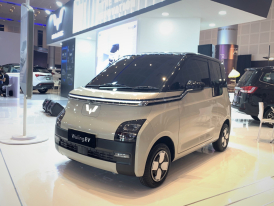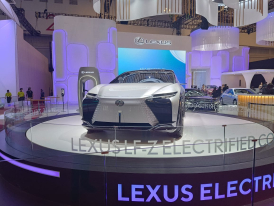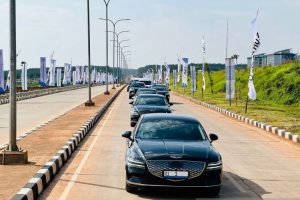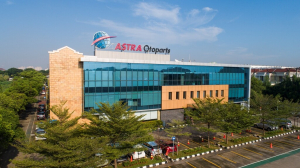Indonesia needs investment for developing EVs despite having good prospect
Indonesia is one of the biggest markets for automotive industry, especially electric vehicles (EV), in 2022. The country's population of 273.5 million people, the rise of its middle-class population to about 52 million and the rise of economic growth to 5.44% year-on-year (yoy) are among the supporting factors. Furthermore, the government has been supportive and welcome investment for the development of EVs.
In light of Indonesia’s commitment toward zero emission by 2060, the government has been encouraging the people to buy electric cars and motorcyles.
Incentive provisions
President Joko "Jokowi" Widodo said on March 16, 2022: “The government will always support any kind of investment in order to develop Electric Vehicles in Indonesia and expand the upstream industry, especially the battery industry.”
On September 13, 2022, the president issued Presidential Instruction (Inpres) No. 7/2022 concerning the use of battery electric motorized vehicles as operational service vehicles and/or individual vehicles for government agencies and regional administrations.
The government also supports the development of EVs by giving incentives to EV users for vehicle test fees, based on the Ministry of Finance Regulation No. 138/PMK.02/2021. Each electric motorcycles will receive an incentive of IDR 4.5 million, while electric cars and buses will receive IDR 13.2 million each.
There are also fiscal incentives for type test certificate (SUT) tariffs of IDR 1 million for electric motorcycles and IDR 5 million for electric cars and buses.
Infrastructure investment is needed
However, due to the lack of infrastructure for EVs in Indonesia today, such as charging stations, the effectiveness of EV use is also minimal.
EV investment prospects can be influenced by several things such as infrastructure, incentives and the number of enthusiasts. Without those factors, it will be difficult for EVs to develop and it will be challenging to find the investors needed for their development.
However, Jokowi's administration has encouraged and supported the development of EVs.
The increasing number of electric buses is one of the examples. Transjakarta, a bus rapid transit system in Jakarta, started using electric buses in 2020 on the Blok M-City Hall route. In 2022, Transjakarta has targeted to have 100 electric buses, Kompas.com reported on June 8, 2022.
Read also: Indonesia aims high on EV, but challenges remain
The availability of charging stations is crucial for any electric car as it is unlikely to charge it at home given the circumstances of electricity outputs and the lack of fast charging cables for cars. There are a lot of charging station brands that might come to Indonesia. One of them is Exicom from India, which seeks to expand in Indonesia.
"In terms of capacity, we are very supportive. We have technical support in Indonesia and our representative offices are in Indonesia," Exicom Country Manager Yustus Maubanu told Indonesia Business Post on the sideline of the Electric Vehicle Indonesia exhibition at the JIExpo, Jakarta, on October 5, 2022.
Maubanu explained that Exicom is the principal provider of EV charging station for Toyota or Hyundai cars. The company also provides charging stations for motorcycles.
EV batteries for cars, buses and logistics
With the ongoing support from the government and the pressure to convert or buy new electric-based vehicles, many are considering to buy EV.
According to Achyan Hambali, a service engineer from EIKTO Battery Co. Ltd., the company has supplied the battery to big car dealers.
"An American company contacted me and they started a survey in 2019. But they began selling a lot [of batteries] in 2021. Previously, it was only for internal use. Now, many dealers or rentals have tried. So, we have supplied EIKTO to big dealers ourselves,” he said.
Hambali explained that using lithium batteries is more cost-effective in the long run.
Carmakers such as Nissan, Wuling, Hyundai, Daihatsu, Toyota, BMW, Mitsubishi, Lexus, Tesla and Porsche have developed EVs. Meanwhile bus producers and assemblers such as Zhongtong, Hino, Laksana, San Group, Tentrem and Adiputro also began to develop EVs.
EV technology had also come to logistical transportation sector such as forklifts. There had been conversions for many forklifts toward using a lithium battery from a battery. Trakindo-CAT, Toyota and others have developed electric forklifts.
By October 3, 2022, Indonesia’s registered EVs reached 28,188 units comprising of: 6 electric freight cars, 56 electric buses, 280 three-wheeled EVs, 4,904 electric cars, 22,833 electrict motorcycles and 109 units of converted motorcycles.
Risk of EVs in Indonesia
Unfortunately, Indonesia is lacking in the availability of EV charging station infrastructure throughout the country. The availability of EV charging stations is only in certain areas in Jakarta. The lack of charging stations in Indonesia prevents EV users to not go too far from the charging stations. Other factors include the high prices of EVs compared to fossil fuel-based cars.
Another problem is the lack of necessary facilities at homes to charge electric vehicles. While electricity output also might cause a long charging time for their cars.
Read also: Risks, opportunities of EVs in Indonesia
Meanwhile, many car brands own charging stations with certain exclusive rights and privileges. While those who use different brands might wait in the queue. This, in turn, causes long waits for charging making EV cars with certain brands a disadvantage.
According to Otomotif.kompas.com in 2022, the price of electric cars start from IDR 200 million. For instance, the price tag for Wuling Air EV is IDR 238-295 million, Nissan Leaf EV is IDR 649 million, Hyundai Ioniq EV is from IDR 682 to 728 million, Hyundai Kona EV at IDR 742 million, MINI EV is from IDR 945-955 million, Lexus EV IDR 1.245 billion while Tesla EV starts from IDR 1.5-2 billion.
Already have an account? Sign In
-
Start reading
Freemium
-
Monthly Subscription
20% OFF$29.75
$37.19/MonthCancel anytime
This offer is open to all new subscribers!
Subscribe now -
Yearly Subscription
33% OFF$228.13
$340.5/YearCancel anytime
This offer is open to all new subscribers!
Subscribe now







